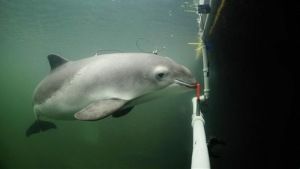News
Noted porpoise dies at research centre
This article is more than 9 years old.
Eigil was important to the study of the small whale species

Eigil came to the Fjord & Bælt in 1997 (photo: Fjord & Bælt)
Fjord & Bælt – a Danish research and experience centre in Kerteminde, Funen – is in mourning following the death of one of its most popular long-term residents and research enablers: the porpoise Eigil.
Eigil, who came to the Fjord & Bælt when the centre was established back in 1997, died earlier this week following a short bout of illness.
“Eigil has been an important component in researching porpoises, which is the purpose of keeping the animals in Kerteminde,” wrote Fjord & Bælt. “The porpoise project in Kerteminde is unique on the global stage. Eigil became one of the most studied whales in the world over the years.
“He was part of many studies in co-operation with the University of Southern Denmark and Aarhus University, and he has helped provide us with knowledge regarding how porpoises use their senses. This knowledge helps us to better understand and protect wild porpoises outside captivity.”
READ MORE: Copenhagen Zoo animals on diet
The show must go on
Eigil is believed to be around 20 years of age at the time of his death, a very old age for porpoises, which generally live to be about 10-14 in the wild.
Despite Eigil’s absence, Fjord & Bælt’s research project will continue thanks to the centre’s two other porpoises, Sif and Freja.
The centre also has three seals named Svante, Tulle and Naja. All the animals reside in true-to-nature basins continuously supplied with fresh seawater from the fjord and straits.










































